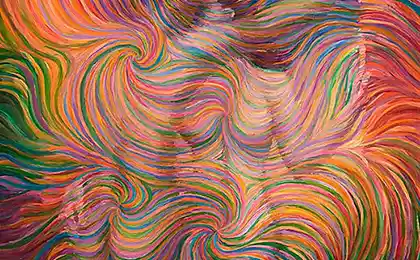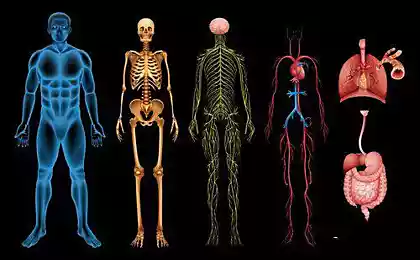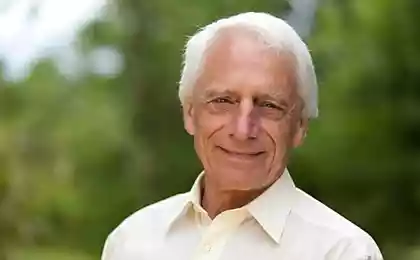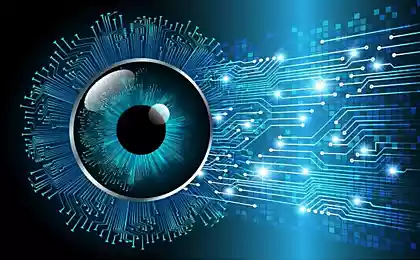514
My BODY is MY business
A good text on an important topic: about the shame of his own body, where it comes from and what to do with it. It is written through the prism of female experience, but the mechanisms of "seeding" the shame apply equally to men and women.
Why are we ashamed of what our body is "too sexy"?
The credibility of the body is something with which we are born, and that in the course of life we have predatory take – influenced by culture, parents, doctors, to name a few possible causes.

We do not agree to it. We are still too young to understand what happens when the tone and stories (narratives) about our body begin to change. And then over time we publish other people's reactions to our body inward, we begin to treat them as their own — and this leads to distance from his own body, confident that we have something wrong, and this wrong must be corrected. We are no longer innocent, we are now responsible for fixing what others consider a problem.
And you know when you began to lose confidence in your body?
For most people there comes a point in adolescence. In women, it may be due to the fact that girls usually gain some weight before the onset of the first menstruation, but many people don't know that this is a normal and natural process. This is the time when some parents and doctors consider the weight gain as a pathology when other children begin to tease us, and we try their first diet, often with the support of significant adults.
In his book "Food under the moonlight" (2000), clinical psychologist Anita Johnston writes:
"Just as the ancient peoples there was a special ritual for girls who have begun menstruating, designed to celebrate their becoming a woman in modern society has its own ritual for adolescent girls, indicating their entry to the world of women. It's called diet."
Don't you want to scream in anger?
In addition to the amount of attention we get about our weight, we are growing Breasts, hips rounded, and our bodies start to transform into sexual creatures. We get unwelcome attention from strangers on the street, friends, brother, fathers and classmates. We are still not Mature enough to handle these messages (regardless of, whether we like them or not), and we don't have enough confidence to protect yourself and feel safe in the world. This power is available to us long before we are ready for it and are confirmed to have it.
With all this attention we don't have much time (or privacy) to connect with your sexuality because we are sexual objects, and our focus moves with his desires, then, do we desire.
Carolyn Knapp, author of "Appetites" (2003), says:
"We deployed his gaze on the external world instead of internal and you learn to experience your body as an object outside of the self, as something that a woman has than who she is.We divide the body into smaller parts – each of which was carefully assessed and subjected to comparison, each flaw is carefully examined and the result is exaggerated, with each part greater than the sum of its parts. I have a big ass? Is there enough flat my stomach? Do the people I'm cute? If want me boys?" Anita Johnson says: "She bought into the myth that her sexuality is because "she is beautiful", instead of understanding that her beauty is born of sexuality."
And of course, it is not surprising that eating disorders very often begin at this time. Many of us will come to what will be obsessed with diets and fitness plans that ultimately promise to give us a desired body type. While few want to be just a sex object, and carry with them the trauma of unwelcome attention from the time when we were too young to understand what was happening. And all of this puts us in a difficult position, because we are women living in an important period of transition, and we want to be taken seriously.
Virge Goods says:
"When people say they want to lose weight, they often mean: I want to be respected. I want to be loved. I want to be seen. I want to be free from fear and self-loathing. Culture weight loss will never give us this, because it is based on systems which are based on fear/hatred, such as sexism, racism, class hierarchy and discrimination based on physical capabilities."
And it becomes clear that we find ourselves in a very confusing situation, which is still trying to navigate somewhere on the crossroads between our bodies, food, sexuality, pleasure, and what we really want.
And here we are looking for self-esteem (worthiness, "being standing"), where it is not found. We use food and their bodies in a variety of ways that can distract us from the truth of life. Someone compresses, someone dismissed someone guzzle, someone limits themselves. Someone who constantly changes partners, and someone who avoids intimacy at any cost.
And at the end of the day we still feel empty because our dignity is not there, it is something that grows from within. It's not a pair of shoes, not the size of jeans and not a flat stomach. It is not the number of people it deems you fit for sex. It's something that we bring up from the depths in the center of his existence.
And until we begin to ask the right questions and to look for what we really need where we can find, we will be in thrall to the endless cycle of dieting and eating disorders, in agreeing to such a rather mediocre life, instead of having to log in to your full power, a power completely different than that which is available, while we just use their bodies.
The author of the popular column "Dear Sugar" Cheryl Strayed sets the title to his readers a provocative question: "What is there side of the tiny global revolution in which you are moving away from hatred toward love to your own skin? What fruit bears it's release?"
Strayed says:
"We don't know that – as representatives of culture, gender, individual people like you and me. The fact that we do not know, is one of the real failures of feminism. We won the right to influence their own lives, we gave ourselves the authority, we received enthusiastic responses, but we never stopped worrying about how our butt looks in jeans. And there are a lot of reasons, many sexist aspects, of course, make a contribution. But in the end, as in all things, change depends on us."
It's true. Change depends on us!
Permission to love your body any kind and size will not come from today's culture in the near future. Patriarchal system will lose very much if women would stop endlessly strive for the ideal of thinness, and the industry of fitness and diets and this, too, will not survive.
The time has come to put an end to this madness and reclaim the trust of the body, so we can help young people grow out of today's toxic culture and focus on more important issues, such as:

In his memoir "Yes, please" (2014), Amy Poehler writes:
"If you're lucky, in your life there will come a time when you will be able to say that it is your hard currency. I quite early decided that it definitely will not be my appearance. I've spent a life trying to come to terms with this idea, and I can say that now I managed it by 15-20 per cent. And I think that's great progress."
Switching from hate to love is a process, sometimes very long, but it is worth the time and effort.
The good news is that the movement for a positive attitude to the body ("body-positive") is gaining momentum. More and more women abandon the diet mentality and focus on more important things than the ideal of thinness.
And although the media attention helps the revolutionary movement from hate to love really begins with the conversations you conduct at home, at work, on the street. It starts when you dine out with friends and decide to talk about more important things than how "to lose weight". (By the way, there is no "summer body" your body is a body for all seasons!). The revolution begins when you refuse to participate to discuss someone's body or regular a diet; when you protect your boundaries, if someone comments on your body or your food, answering something like: "you Have no right to talk about my body. My body is my business."
This can happen when you go to your body with compassion and will listen to him with kindness and curiosity.
To choose this path means to be a pioneer. You're ahead of the column. You are like a fish swimming against the current when everyone else is amenable to flow. But it gives much more strength than to maintain the status quo.
This is the place where you will find freedom and build a lasting peace with your body.
Let's move forward, together. Imagine freedom – for yourself and everyone around you.
Come let soft. Show it to us.
Also interesting: How to love your body
Psychosomatics: what will tell Your body
To be free, we all need to come to a very great compassion for the body. In today's paradigm, this will defiantly brave talk, but the one who seeks the truth and intuitively feels the path to freedom, this discovery will bring indescribable delight. We all have to go first.published
Translation: Olga Zotova
Source: olgazotova.com/body-shame/
Why are we ashamed of what our body is "too sexy"?
The credibility of the body is something with which we are born, and that in the course of life we have predatory take – influenced by culture, parents, doctors, to name a few possible causes.

We do not agree to it. We are still too young to understand what happens when the tone and stories (narratives) about our body begin to change. And then over time we publish other people's reactions to our body inward, we begin to treat them as their own — and this leads to distance from his own body, confident that we have something wrong, and this wrong must be corrected. We are no longer innocent, we are now responsible for fixing what others consider a problem.
And you know when you began to lose confidence in your body?
For most people there comes a point in adolescence. In women, it may be due to the fact that girls usually gain some weight before the onset of the first menstruation, but many people don't know that this is a normal and natural process. This is the time when some parents and doctors consider the weight gain as a pathology when other children begin to tease us, and we try their first diet, often with the support of significant adults.
In his book "Food under the moonlight" (2000), clinical psychologist Anita Johnston writes:
"Just as the ancient peoples there was a special ritual for girls who have begun menstruating, designed to celebrate their becoming a woman in modern society has its own ritual for adolescent girls, indicating their entry to the world of women. It's called diet."
Don't you want to scream in anger?
In addition to the amount of attention we get about our weight, we are growing Breasts, hips rounded, and our bodies start to transform into sexual creatures. We get unwelcome attention from strangers on the street, friends, brother, fathers and classmates. We are still not Mature enough to handle these messages (regardless of, whether we like them or not), and we don't have enough confidence to protect yourself and feel safe in the world. This power is available to us long before we are ready for it and are confirmed to have it.
With all this attention we don't have much time (or privacy) to connect with your sexuality because we are sexual objects, and our focus moves with his desires, then, do we desire.
Carolyn Knapp, author of "Appetites" (2003), says:
"We deployed his gaze on the external world instead of internal and you learn to experience your body as an object outside of the self, as something that a woman has than who she is.We divide the body into smaller parts – each of which was carefully assessed and subjected to comparison, each flaw is carefully examined and the result is exaggerated, with each part greater than the sum of its parts. I have a big ass? Is there enough flat my stomach? Do the people I'm cute? If want me boys?" Anita Johnson says: "She bought into the myth that her sexuality is because "she is beautiful", instead of understanding that her beauty is born of sexuality."
And of course, it is not surprising that eating disorders very often begin at this time. Many of us will come to what will be obsessed with diets and fitness plans that ultimately promise to give us a desired body type. While few want to be just a sex object, and carry with them the trauma of unwelcome attention from the time when we were too young to understand what was happening. And all of this puts us in a difficult position, because we are women living in an important period of transition, and we want to be taken seriously.
Virge Goods says:
"When people say they want to lose weight, they often mean: I want to be respected. I want to be loved. I want to be seen. I want to be free from fear and self-loathing. Culture weight loss will never give us this, because it is based on systems which are based on fear/hatred, such as sexism, racism, class hierarchy and discrimination based on physical capabilities."
And it becomes clear that we find ourselves in a very confusing situation, which is still trying to navigate somewhere on the crossroads between our bodies, food, sexuality, pleasure, and what we really want.
And here we are looking for self-esteem (worthiness, "being standing"), where it is not found. We use food and their bodies in a variety of ways that can distract us from the truth of life. Someone compresses, someone dismissed someone guzzle, someone limits themselves. Someone who constantly changes partners, and someone who avoids intimacy at any cost.
And at the end of the day we still feel empty because our dignity is not there, it is something that grows from within. It's not a pair of shoes, not the size of jeans and not a flat stomach. It is not the number of people it deems you fit for sex. It's something that we bring up from the depths in the center of his existence.
And until we begin to ask the right questions and to look for what we really need where we can find, we will be in thrall to the endless cycle of dieting and eating disorders, in agreeing to such a rather mediocre life, instead of having to log in to your full power, a power completely different than that which is available, while we just use their bodies.
The author of the popular column "Dear Sugar" Cheryl Strayed sets the title to his readers a provocative question: "What is there side of the tiny global revolution in which you are moving away from hatred toward love to your own skin? What fruit bears it's release?"
Strayed says:
"We don't know that – as representatives of culture, gender, individual people like you and me. The fact that we do not know, is one of the real failures of feminism. We won the right to influence their own lives, we gave ourselves the authority, we received enthusiastic responses, but we never stopped worrying about how our butt looks in jeans. And there are a lot of reasons, many sexist aspects, of course, make a contribution. But in the end, as in all things, change depends on us."
It's true. Change depends on us!
Permission to love your body any kind and size will not come from today's culture in the near future. Patriarchal system will lose very much if women would stop endlessly strive for the ideal of thinness, and the industry of fitness and diets and this, too, will not survive.
The time has come to put an end to this madness and reclaim the trust of the body, so we can help young people grow out of today's toxic culture and focus on more important issues, such as:
- What brings me pleasure and satisfaction?
- How I want to live my life?
- I want to Express in this world?
- How can I embody your power and sexuality? (How can I stand in my power and embody my own sexuality?)

In his memoir "Yes, please" (2014), Amy Poehler writes:
"If you're lucky, in your life there will come a time when you will be able to say that it is your hard currency. I quite early decided that it definitely will not be my appearance. I've spent a life trying to come to terms with this idea, and I can say that now I managed it by 15-20 per cent. And I think that's great progress."
Switching from hate to love is a process, sometimes very long, but it is worth the time and effort.
The good news is that the movement for a positive attitude to the body ("body-positive") is gaining momentum. More and more women abandon the diet mentality and focus on more important things than the ideal of thinness.
And although the media attention helps the revolutionary movement from hate to love really begins with the conversations you conduct at home, at work, on the street. It starts when you dine out with friends and decide to talk about more important things than how "to lose weight". (By the way, there is no "summer body" your body is a body for all seasons!). The revolution begins when you refuse to participate to discuss someone's body or regular a diet; when you protect your boundaries, if someone comments on your body or your food, answering something like: "you Have no right to talk about my body. My body is my business."
This can happen when you go to your body with compassion and will listen to him with kindness and curiosity.
To choose this path means to be a pioneer. You're ahead of the column. You are like a fish swimming against the current when everyone else is amenable to flow. But it gives much more strength than to maintain the status quo.
This is the place where you will find freedom and build a lasting peace with your body.
Let's move forward, together. Imagine freedom – for yourself and everyone around you.
Come let soft. Show it to us.
Also interesting: How to love your body
Psychosomatics: what will tell Your body
To be free, we all need to come to a very great compassion for the body. In today's paradigm, this will defiantly brave talk, but the one who seeks the truth and intuitively feels the path to freedom, this discovery will bring indescribable delight. We all have to go first.published
Translation: Olga Zotova
Source: olgazotova.com/body-shame/























